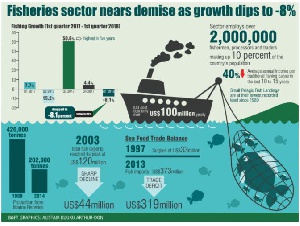It used to be one of the booming sectors of the economy. It generated massive employment for people. It was a source of livelihood for many. It was one among a few sectors in which the economy was recording trade surpluses. But today the tables have turned. The fisheries sector has gradually and helplessly lost its grip on the economy.
To put things in a more appreciable perspective, consider some milestones of the industry in the past.
A February 2016 report by the Food and Agriculture Organisation (FAO) of the United Nations states that in 1999 production from marine fisheries was almost 420,000 tonnes – but had declined to 202,000 tonnes by 2014.
And in 2003 total fish exports reached its peak at the value of US$120million, but this has sharply declined to US$44million.
Again, the sea food trade balance recorded a surplus of US$33million in 1997, but as of 2013 fish imports have reached a whopping US$373million – translating into a trade deficit of US$319million.
The situation is even more miserable when considered from the sector’s contribution to GDP over the past 12 years. In these years, the highest the sector has contributed to GDP was just 2.7 percent, and that was in 2008. At the same time, its sister-sector – crops – contributed 22.4 percent to GDP.
And since 2010, when — as figures from the Ghana Statistical Services (GSS) have shown—it contributed 2.3 percent to GDP, the sector’s contribution to the economy has remained below 2 percent; reaching an all-time low of 1.1 percent in 2016 within the period under consideration. Last year, it contributed only 1.2 percent to the economy.
When it comes to the sector’s growth, there is nothing to write home about. Considered from just within a 1-year period, fisheries growth has fallen into the negative.
In the first quarter of 2017 it grew by 7.7 percent, then took a sharp nose dive to -15.2 percent in the second quarter. But in the third quarter it experienced a massive turnaround when it grew by 50.6 percent, making it the highest in five years.
Thinking that the magic would be sustained in the quarter, it rather dropped sharply to 4.4 by end of 2017; and, sadly, it further dropped to -8.1 percent in first quarter of this year.
Yet this is a sector that the Ministry of Fisheries and Aquaculture has said provides jobs for over two million fishermen, processors and traders. Those two million and their dependents, according to the same ministry, make up 10 percent of the country’s population.
The Ghana Small-scale Fishers, Traders and Processors has also said that the average annual income per traditional fishing canoe has dropped by as much as 40 percent in the last 10 to 15 years, and landings of small pelagic fish are at their lowest recorded level since 1980.
Clearly, the sector is a very important one and its demise would seriously impact negatively on the economy.
The FAO report cited earlier states that some of the challenges hampering growth in the sector include over-exploitation of marine stocks by industrial fleets, leading to decline of harvest by marine fisheries.
Again, poor landing sites, post-harvest losses, poor equipment base, and a lack of refrigeration facilities are among the sector’s challenges.
The Ghana industrial Trawlers Association has also decried the lack of sufficient and realistic data in the sector, saying data needs to be updated for effective policy-making.
Also, the Ghana Small-scale Fishers, Traders and Processors has called on government to enforce stricter penalties for those who use light, chemicals and explosives in fishing – practices which are depleting the country’s fishing stock.
The activities of Illegal, Unregulated and Unreported (IUU) fishing is also costing the economy dearly. It is estimated these activities of IUU cost the economy over US$100million yearly.
From these analyses, it is obvious that the fisheries sector is highly challenged; and if prompt measures are not taking by government to put it back on good footing, the sector will finally collapse – leaving millions unemployed and impoverished.
Business News of Tuesday, 3 July 2018
Source: thebftonline.com













